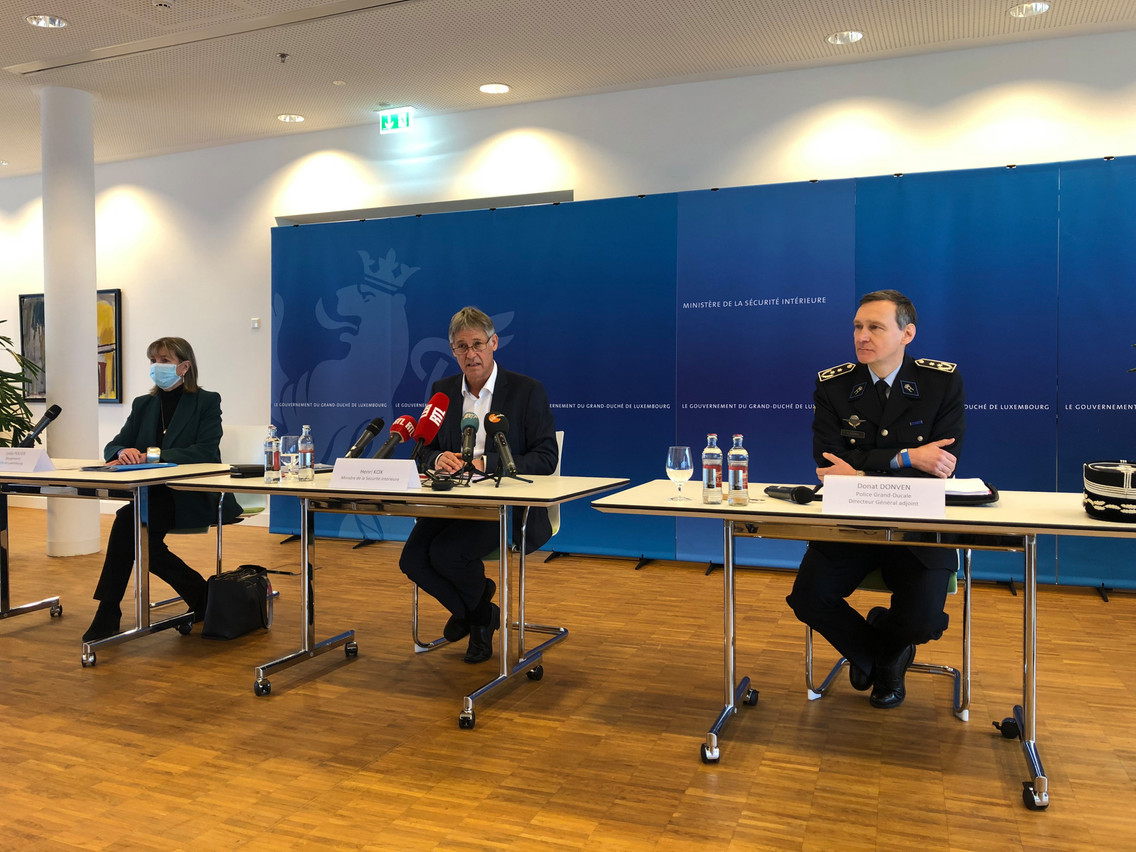Kox (Déi Gréng) already on Tuesday had said that police would be for protests this coming weekend, but refused to disclose operational details, such as the number of officers that would be deployed. Prime minister Xavier Bettel (DP) had said that there would be a perimeter, which protesters would be allowed to pass through. Anyone outside of this perimeter risked being penalised, he said.
“Freedom of opinion and the right to protest are basic freedoms,” said Kox. “This freedom must be granted, but without harming a third person, without spreading hate and without damage to institutions or personal attacks.” Police will be carrying out ID checks, Kox said, citing risks of grave harm.
Scheduled protests will be allowed to go ahead between the Place de l’Europe in Kirchberg and the Glacis, Kox said. The Glacis car park will be half closed to give protesters space.
Amnesty International on Wednesday its annual candlelit march to mark Human Rights Day on Friday over concerns that it would not be able to guarantee the safety of participants. “After talks with us, they took responsibility not to be exposed to this,” he said about threats circulated in anti-vaxx groups on social media to hijack the protest. “It is regrettable that these consequences have had to be taken,” Kox said, adding that he would support the organisation through one of its other actions, such as lighting an Amnesty candle.
Rise for Climate activists have planned a protest on Saturday. The organisers of the Marche Blanche movement, which has been holding regular and peaceful protests in the capital over the past weeks, have scheduled a march on Sunday at 2.30pm starting at the Philharmonie. “There was never a danger for a third person,” Kox said about the protests so far. “I hope that there won’t be a solidarisation with rioters. This is what happened last weekend.”
On 4 December, a protest in Luxembourg City had when splinter groups stormed the Christmas market in Place de la Constitution. The city closed all markets, meaning a second location in Place d’Armes was already vacated when protesters broke down barriers around the site.
People threw eggs at prime minister Xavier Bettel’s house and pictures circulated on social media showed scratches on a car parked outside.
“The measures are exceptional,” said city mayor Lydie Polfer about restricting areas where protesters can gather. “It is our duty and responsibility that this doesn’t happen again,” she said about last weekend’s escalation. Polfer said another human rights NGO, Terre des Hommes, had also cancelled a protest.
Protests normally must be registered eight days in advance and a route is then agreed with authorities and police. “I wish and hope that they will stick to this,” she said about what has been agreed with this weekend’s organisers.
Donat Donven, deputy secretary general of the police, urged protesters to peacefully make right of their freedom of expression and distance themselves from those violating democratic values. He would not reveal more details of the planned police response, also in light of protesters that might gather outside of the perimeter, but said officers had been given additional means to ensure safety.
Reinforcements from neighbouring countries will support the Luxembourg police this weekend, he said, without revealing which countries they would come from and how many officers would arrive. Leave days have been cancelled for some officers.
Kox said clear directives had been given that Christmas markets must be safe as well as institutions and private homes.
Around 2,000 people had gathered in the city, according to police, to demonstrate against announced by the government. These include the so-called 2G (vaccinated, recovered) CovidCheck for leisure activities--largely excluding unvaccinated people from public life--and the 3G check in the workplace, with for those who have declined to get jabbed.
The latter has prompted fears among employees that they could be refused work or sanctioned for failing to provide valid documents as well as facing expensive testing. Labour unions have said no one should lose their job over failing to provide a valid CovidCheck certificate. Financial sector union Aleba this week urged companies to allow people to to avoid CovidCheck altogether.
The largest group of protesters on 4 December marched from the Glacis to the Chamber of Deputies, where some individuals tried to push their way into parliament.
Donven said police would try to de-escalate situations. A tough crackdown on protesters at the Christmas market on 4 December, for example, could have easily caused panic, creating additional danger for families and uninvolved participants. “We are doing this with the best knowledge and good conscience,” he said of police response to incidents. “If we did the risk assessment today for what happened last Saturday, it would probably be different,” he said. “We can only work with the information we have.”
There will be no border checks, Donven said, following reports that agitators from outside the country had infiltrated the protests last weekend.
A Luxembourg City trade group, the UCVL, on Monday had expressed fears that the weekend’s protests could in the run-up to Christmas, urging city authorities to refuse requests for protests staged during opening hours.
